Open internet and inclusive technology
New digital technology and the internet brought with it a promise of equal access to knowledge, openness and connection. Their ubiquity has brought opportunity for progress. However, access to digital technology is vastly unevenly distributed. Technology, especially when relying on artificial intelligence, location and biometric data, can amplify social, racial and environmental injustices. We work to bring back the original purpose of an open internet and enable inclusive, sustainable technologies that work for all and for the greater good.
Filter resources
-

EDRi-gram, 4 December 2024
This week, a new college of European Commissioners was confirmed by the European Parliament. Together with a broad civil society coalition, we welcomed them with our collective vision for EU policy that puts technology in the public interest. This call-to-action for the new leadership is crucial, given the worrying Commissioners' hearings in the European Parliament. Their focus on corporate and security interests steeped in, wrapped in a harmful logic of constant growth and control. Below, you can also read our main takeaways from the Commissioners' hearings. It was a mixed bag that reiterated the importance of our efforts towards achieving digital justice. More, we share a critical analysis of the EU's twin transition in times of crises, and its connection to green extractivism and militarisation. Romania has also been on our minds this week – with an unexpected extremist candidate winning the first round of the presidential elections. Civil society in Romania is ringing the alarm about the role that TikTok played in amplifying an existing democracy deficit and social issues, how the tech platform relates to DSA obligations, and what the EU and national authorities can do about it. Finally, EDRi's Executive Director Claire Fernandez is preparing for a leadership transition in 2025. Join us in thanking Claire for her dedication and impact, while reading some reflections below.
Read more
-
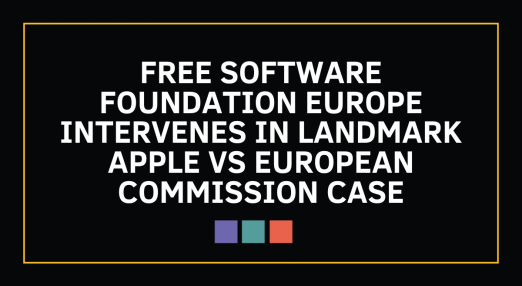
Free Software Foundation Europe intervenes in landmark Apple vs European Commission case
EDRi member Free Software Foundation Europe (FSFE) is taking a stand against Apple in a landmark case at the Court of Justice of the European Union, where the tech giant is challenging EU digital law. This intervention could help users and developers of Free Software.
Read more
-
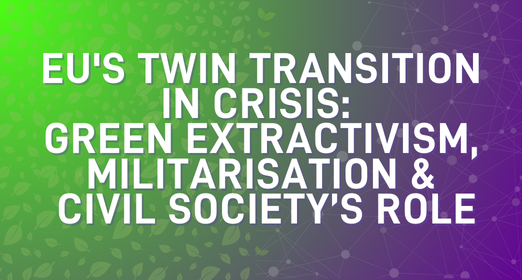
EU’s twin transition in crisis: green extractivism, militarisation and civil society’s role
In June 2024, technologists, advocates, researchers, designers, artists and funders. met at Mozfest, to dismantle the underlying assumptions behind the techno-solutionist paradigm of the "twin transition”. This article summarises the main points of debate, and lays out next steps by mapping examples of transnational solidarity among digital and climate justice groups that can inspire field-building moving forward.
Read more
-
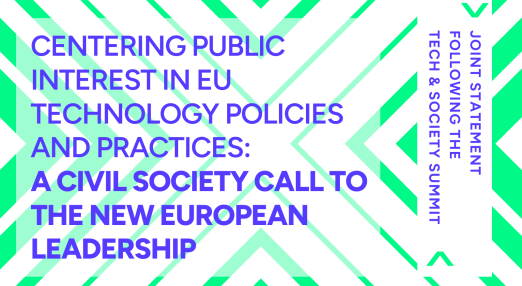
Centering public interest in EU technology policies and practices: A civil society call to the new European leadership
Read the joint statement of civil society organisations following the Tech & Society Summit (1st October, Brussels).
Read more
-

EDRi-gram, 20 November 2024
For the last two weeks, we’ve been tuning in to the European Commissioner-designates’ hearings in the European Parliament to hear how would-be EU decision-makers in the Commission envision the role of technology in our future. Some hearings were riveting, while others deeply worrying. It was encouraging to hear that the enforcement of existing digital laws like the GDPR and DSA was high on some Commissioner-designates’ priorities. However, there were also many disturbing mentions of tech hype buzzwords, and no strong commitments to tackle surveillance or protect our right to safe and confidential communications online through encryption. This month, our neighbours across the Atlantic have been reeling from the results of their Presidential election. However, we’re worried about more than just that when it comes to the US. A decade after Snowden’s revelations, and despite continuing privacy concerns, surveillance and mass data collection continue under the EU-US Data Privacy Framework. And the EU appears to be willing to compromise our rights for geopolitical and economic gains.
Read more
-
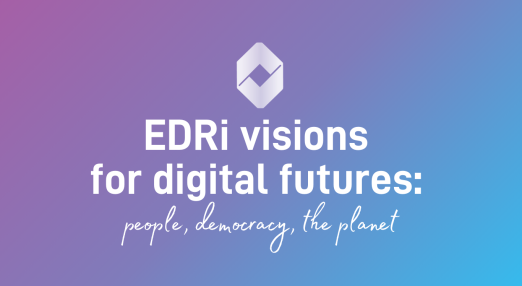
Building technology by, for, and of the people: A vision for our digital future
Together, we can protect human rights, strengthen democracy, and reshape societal systems. Read about our commitment to prioritising building technology by, for, and of the people, as part of our Vision for 2024 and beyond.
Read more
-

EDRi-gram, 24 October 2024
With winter almost on our doorstep, we're warming up for a busy few months in the EU digital rights space. In early November, we'll be paying close attention to the European Parliament hearings of the Commissioner-designates selected by Ursula Von Der Leyen. Earlier this month, the European Commission unveiled its highly anticipated Digital Fairness Fitness Check report. The report is likely to have a major influence on the Commission’s planned Digital Fairness Act proposal, which will affect our digital rights. Let’s unpack this together. Protection of young people online should be achieved through empowerment not exclusion. This is the highlight of our and our members' submission to the European Commission’s call for evidence for the Digital Services ActArticle 28 guidelines for the protection of minors online. This month, we also co-hosted – along with 41 other civil society organisations – the Tech and Society Summit. A first-of-its-kind space when we're inundated with industry-sponsored events, the summit created a bridge between civil society and new policymakers, to achieve accountable, people-focused policies that advance everyone’s digital rights.
Read more
-
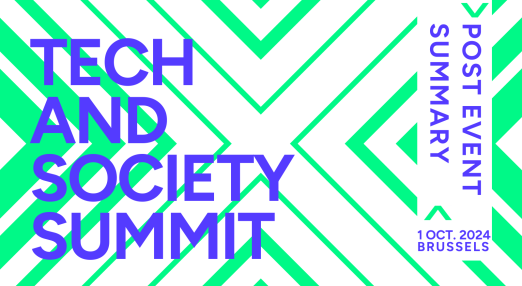
Tech and Society Summit: Decision-makers and civil society articulate a digital agenda that centers people, planet and democracy
On 1 October 2024, 41 civil society organisations – including EDRi – co-hosted the Tech and Society Summit. Throughout the day, EU decision-makers, journalists and civil society held discussions, joined panels and participated in activities that fostered dialogue about the intersections of technology, society and the environment.
Read more
-
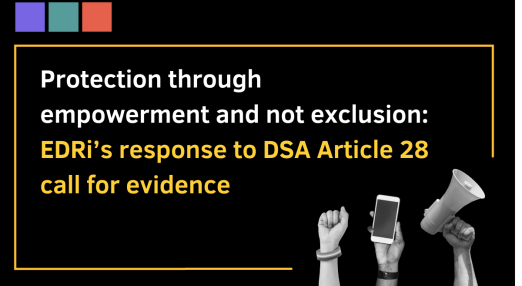
Protection through empowerment and not exclusion: EDRi’s response to DSA Article 28 call for evidence
On 30 September, EDRi and its members submitted a response to the European Commission’s call for evidence for the DSA Article 28 guidelines for the protection of minors online. The submission focused on the importance of a holistic approach and relying on empowering young people, rather than excluding them.
Read more
-

EDRi-gram, 9 October 2024
Last week, we gathered with hundreds of EU decision-makers, Members of European Parliament, civil society representatives and journalists at the Tech and Society Summit in Brussels. As one of the 41 co-organisers of the Summit, we were inspired by the visionary ideas in the various panels, discussions and chat – all towards centering people, the planet and democracy in the EU tech agenda. Stay tuned for more highlights and recordings from the day. One of the main takeaway from the Summit was that systems of control and surveillance – which are becoming increasingly central to EU policies – will not make us safer. Nowhere is this more apparent than at Europe’s own borders where technology is being used to dehumanised migrants. Read the blog by Access Now’s Caterina Rodelli who travelled across Greece to see first-hand how this is happening. On a positive note, the infamous “Chat Control” proposal is dead and buried again – for now. And we have the Dutch to thank for this positive development! We have more details for you.
Read more
-

Prioritising safety, participation, and community care: A vision for our digital future
Together, we can protect human rights, strengthen democracy, and reshape societal systems. Read about our commitment to prioritising safety, participation, and community care, as part of our Vision for 2024 and beyond.
Read more
-

EDRi-gram, 25 September 2024
With summer on its way out, there might be a chill in the air. But there’s none to be found in Brussels and the digital rights world. Last week, we were glued to our screens as the European Commission President Elect, Ursula Von Der Leyen, announced the Commissoners-Designate and what they’ll be in charge of. Now, these Commissioners will go through live-streamed hearings at the European Parliament next month before starting work. We’ll be watching with interest… and maybe popcorn. This week, we’re also concerned about the impact of age verification proposals on fundamental rights and the well-being of children and young people. Spoiler alert: it’s not good. Evidence & lived experiences show these tools are dangerous, discriminatory and unsafe. EDRi and 63 organisations and experts wrote to the European Commission to urge them to halt proposals for using such tools in the implementation of the Digital Services Act (DSA) and the eIDAS Regulation. Now that we’ve all firmly, albeit sadly, turned off our summer out-of-office messages, it’s also time to catch up on what Google, Meta, X and other tech giants have been up to over the summer, especially with the DSA and Digital Markets Act (DMA) in place.
Read more
